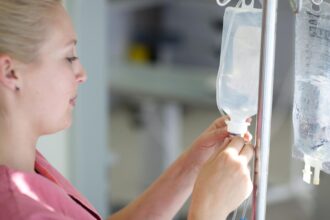Want to stay on top of the science and politics driving biotech today? Sign up to get our biotech newsletter in your inbox.
Hi! Today we see that prime editing works nicely in monkeys, learn more about the potential new bill to speed treatments for life-threatening diseases, and find that a Regeneron (formerly Decibel) therapy may restore hearing in children.
The need-to-know this morning
• Sanofi said it will spin out its consumer health unit and cut costs in other areas in order to increase spending on research and development of new medicines. Separately, the French pharma giant reported third-quarter earnings and revenue that fell short of analyst consensus. Sanofi reiterated its financial forecast for the remainder of the year, but new, long-range guidance for 2024 and 2025 implies financial results lower than current analyst estimates.
• Abbvie reported adjusted third-quarter earnings of $2.95 per share, beating the consensus estimate. Revenue was $13.93 billion, down 6% year over year but better than consensus. Sales of the arthritis medicine Humira fell 36% from the previous year to $3.5 billion, largely due to generic competition, but were still in line with consensus. The company raised financial guidance for the remainder of the year.
• The FDA approved a new treatment for ulcerative colitis made by Eli Lilly. As Jonathan Wosen reports, the drug, called Omvoh, is the first to target an immune signaling pathway that plays a key role in sustaining the chronic, gastrointestinal disease.
Prime editing effective in monkey liver cells
Prime Medicine has demonstrated that a new form of hyper-specific gene editing worked well in monkey liver cells. Prime editing, as it’s called, not only slices genes but can also insert, delete, or rewrite short stretches of DNA. The company aims to work on 18 different diseases with its prime editing technology. David Liu of the Broad Institute, who has led this work, estimated that around 90% of genetic diseases could theoretically be targetable with prime editing.
Prime Medicine may not be the only company chasing this technology, nor the first to have demonstrated efficacy in monkeys. Tessera Therapeutics, a rival startup, has been vague about its science, but some say it looks “exactly like” prime editing. And it released monkey data in May targeting the liver that also showed efficacy.
Read more.
Are there still too many biotech companies?
What makes biotech stocks go up? And why are venture capitalists so optimistic? We cover all that and more this week on “The Readout LOUD,” STAT’s biotech podcast.
Our colleague Andrew Joseph joins us to explain the decades-old cancer-treating technology that had its star turn at this week’s big oncology conference in Europe. We also discuss the latest news in the life sciences, including the future of Alzheimer’s disease treatment, a multibillion-dollar deal, and the return of the biotech mega-round.
Read more.
ALS advocates back Senate bill to speed rare disease treatments
A Senate committee is considering a bill that would make it easier for experimental drugs for serious or life-threatening diseases to achieve approval, if early evidence shows that it works. They’d be approved under a provisional status that would initially last two years, and could be renewed for eight. During that time, drug companies would be required to use registries to track patient use of drugs.
The ALS advocacy community is lobbying heavily for the bill, which is called the Promising Pathway Act. Just a month ago, FDA advisors vetoed the experimental ALS drug NurOwn.
“We do not support saying to this generation, ‘Thank you for your contribution to research. Now, go home and prepare to die,’” said Sandra Abrevaya, who founded I Am ALS with her husband, Brian Wallach, who is living with ALS.
Read more.
Regeneron gene therapy improves hearing in child
A gene therapy from Regeneron helped improve auditory responses in a young child with a genetic form of profound hearing loss, the company said. A mutation in the otoferlin gene essentially shuts off auditory circuits, so Regeneron’s therapy is designed to allow them to function correctly. The treatment was initially developed by Decibel Therapeutics, which was acquired by Regeneron just last month.
The otoferlin data is preliminary and from a Phase 1/2 trial. The child was given an intracochlear injection of DB-OTO in one ear, and saw some improvement in hearing sensitivity.
“We look forward to following this child and others further to determine if DB-OTO gene therapy can restore clinically meaningful hearing as they are learning to interact with the world,” Regeneron said in a statement.
More reads
• Abbott to cease sale of infant probiotic products after FDA warning, Reuters
• While stacking on deals, Merck hopes internal ADC work will see the clinic in the ‘next couple years’, FierceBiotech
• 2seventy bio stock drops 24% as competition catches up with BMS-partnered multiple myeloma drug, Endpoints









